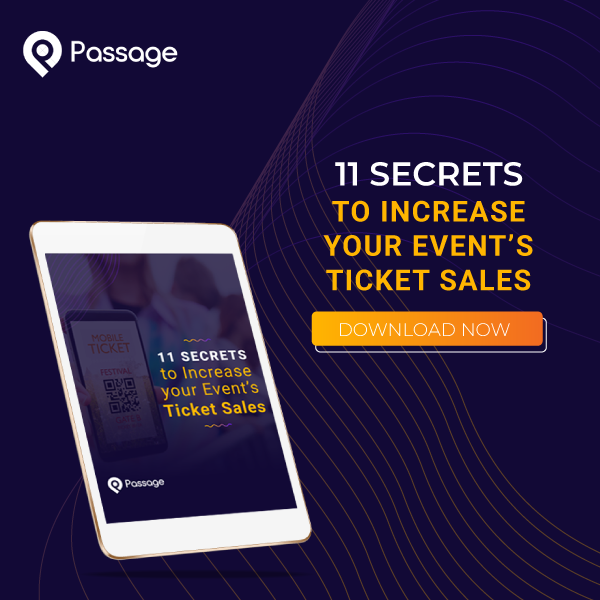Virtual and live-streamed events are becoming more and more popular in this new work-from-home era. They allow event producers and artists to reach fans all over the world, and guests are able to join any event from the comfort of their homes.
But the virtual event landscape is also noisy. There’s a lot of competition online for your fans’ attention. How can you make your event stand out from the crowd?
Follow these strategies to get more guests to attend your virtual event.
1. Establish a home base
Start building anticipation for your virtual event while you’re still in the planning process. Set up a simple landing page with a teaser about your event and an email opt-in form. This allows you to capture guest information while you have their attention. Then, you can remarket to them as your event approaches. Stay in touch consistently, and keep your fans posted on your progress and what kinds of things they can expect from your event.
2. Use social media (the right way)
It’s not enough just to put up a website and hope that the internet will find it. To make this work, you’ll need to drive traffic to your landing page.
A lot of event producers consider social media to be the holy grail of free promotions, but over the years it has become increasingly difficult to reach your audience organically. Leverage social media the right way by combining a one-two punch of paid promotions and organic content.
Start with a few campaigns on social media platforms like Facebook, Instagram, and Twitter; you can set any budget you like and test different variables, like the audience or ad copy. Once you figure out the right combination, you can increase your budget and reach more fans with a positive return on investment. This will help prevent you from having to scramble with a huge advertising push right before your event.
3. Get the whole team involved
Make it simple for any speakers, artists, musicians, or other featured entertainers to help you get the word out by arming them with sample social media posts, graphics, and even promo codes to share with their audiences. By reaching out to their networks and fans, you may be able to boost ticket sales for this event AND you’ll have the contact info for those guests so you can remarket to them for all your future events.
Need help setting up your virtual event? Schedule an onboarding call with our support team. We’ll set everything up for you!
4. Get guests involved, too
Want to tap into the social networks of your customers? Offer them a discounted ticket for sharing it!
For example, on your checkout page, offer $1 off the ticket price for sharing your event with their friends or followers on Facebook and Twitter. You might be surprised how many customers will happy blast a post that says, “I’m going to MusicFest this Saturday. Who’s coming with me?” with a link to your event, in exchange for a small discount. And you’ll get hundreds of more eyeballs on your event.
Passage is one of the only ticketing platforms that offer real-time discounts for social media sharing. Customers are much more likely to share something if it gives them instant gratification: an immediate discount on THIS PURCHASE, not a future sale.
Read more about social discounts and how to set them up for your event here.
5. Partner with a nonprofit
Partner with local organizations, like a cub scout troop or junior league, to do a virtual ticket fundraiser. Clubs and nonprofits always need new ways to raise money, and their membership body is filled with potential new customers for you.
Offer to donate a portion of each virtual ticket sale to their organization, or for each ticket sold by one of their members. You can setup a unique promo code just for them (learn how to setup your first promo code here) to track the number of tickets their members sell.
You could even provide them with a unique link to share online, and track sales made through that link on your Passage admin dashboard.
6. Search for sponsors
Just because your event is online does not mean you have to miss out on the sponsor revenue you may have counted on in the past for an in-person event. Sponsors can help to increase your audience as well as boosting revenue.
This is a great time to update your sponsorship pitch (and if you don’t have one yet, check out our blog post all about how to create one!). As in-person events start to open back up, you’ll have an even more robust set of offerings for potential sponsors because you can help promote their business both online and in person.
What should you include in your virtual event sponsorship package? Offer to mention sponsors by name during your live stream. Put their logo and message on every digital ticket sold. You could even add 15, 30, or 60-second banners onto your live stream so their message displays during your event. Get creative! And don’t be shy about asking sponsors what would be valuable to them, then seeing if there’s a way to work their ideas into your virtual event.
7. Price it right
If this is your first virtual event, figuring out the right price point for tickets can be a tricky business. You might feel like you’re just guessing what your customers will be willing to pay. Look at similar events in your area – what are their ticket prices? If your event is one-of-a-kind or there are no local comparisons, look at ticket prices in similar markets around the country for best practices on price.
Some new events go the route of offering free admission, with the hopes that it will attract more people who will then spend money in the live stream (on merchandise or Instant Donations). Who wouldn’t come to a FREE event?
Free can actually backfire, though, if customers mistakenly perceive that free means not worth their money. It also means that 100% of your revenue will come on the day of the event, which is risky. Instead of free access, consider offering a VIP pass option as well as a lower-cost general admission. Provide VIP ticket holders with access to a private group video chat with the artist, a merch package, or something else of value to make them feel extra special for the higher price point. This will help you earn ticket revenue in the weeks leading up to your event, which helps with cash flow and budgeting.
8. Be genuine
There’s nothing worse than a cheesy sales pitch. Modern consumers don’t want to be sold. But we do want to know about products and events that we might enjoy!
When you’re promoting your virtual event, resist the urge to “sell” your customers. Instead, focus on telling your story: why are you really excited about this event? Why did you decide to produce it in the first place? Why would your best friend want to attend?
Making money is important, but hopefully, you have a passion for the event aside from the profits you hope to gain. Let that side of you show instead of putting on your “sales” hat. You’ll come across as more credible to your fans, and will sell more tickets being genuine than with a canned sales pitch.
Ready to start selling tickets for your virtual event? Schedule an onboarding call with our support team. We’ll set everything up for you!











